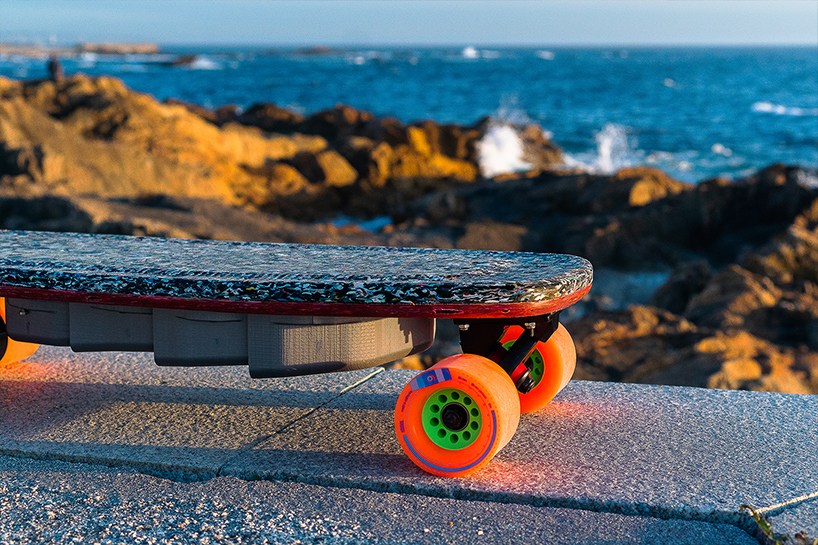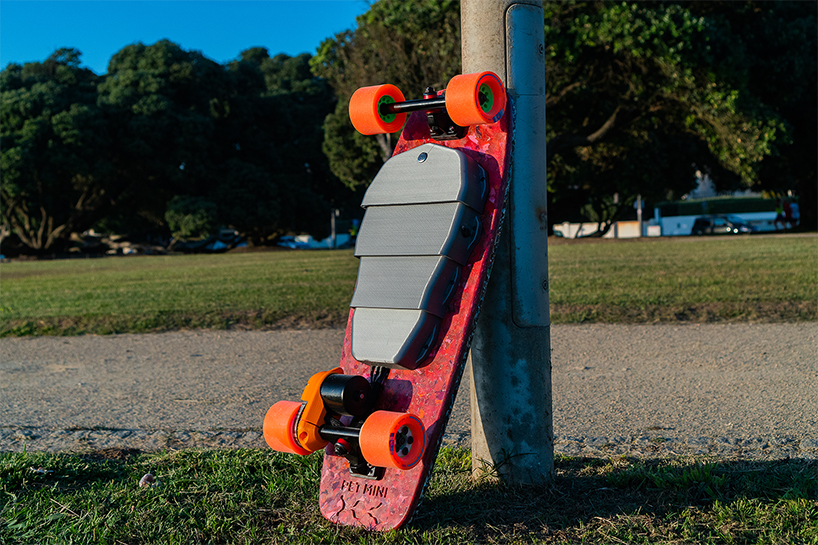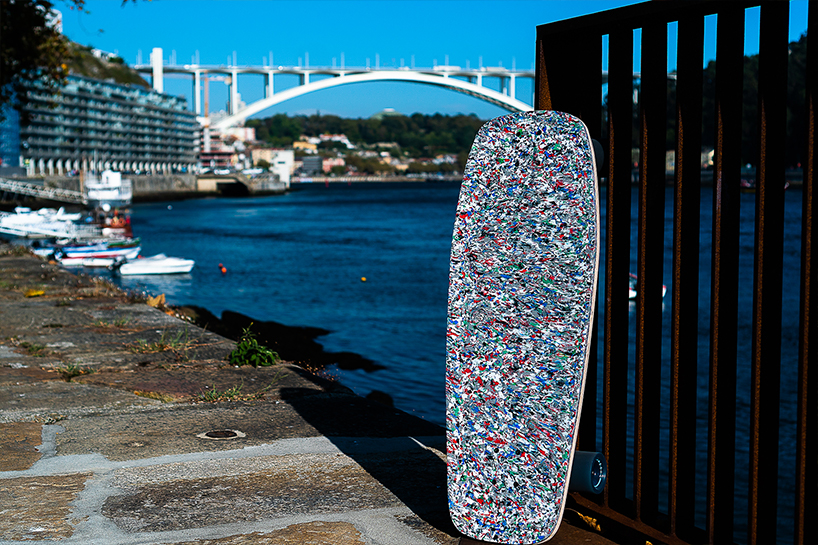P.E.T MINI Electric Skateboard

Useful information
- Team members
- João Leão Rui Mendonça VIVA Lab Precious Plastic
- Country
- Portugal
- Keywords
- Industrial Design Electric Transport Plastic Recycling Digital Fabrication Open Design
Short Description
P.E.T MINI is an Open Source, Recycled Electric Skateboard for urban transportation. With the goal t
Detailed Description
As in every design endeavor it all started with a problem, In fact two of them. The first encountered problem was the plastic waste, that designer João Leão encountered every day on the beaches of Porto that washes to the shore from all-over the world. The second problem consisted on the hectic commutes of endless hour's that he lives in the streets of Porto. The solution? Create a fast-personal transportation that uses recycled thermoplastics as the main manufacturing material.
Leão took inspiration from the anatomy of an Armadillo for the electronics enclosure, by designing and 3D printing a series of modular pieces along the bottom of the board.
For the mechanical parts the components for the drive train, the motor mounts were designed and manufactured locally at VIVA Lab and the recycled plastic Deck using Precious Plastic Machines.
Weighing 8kg, with its smaller 75 cm long size it becomes easier to transport, with a top speed of 35 km/h, a range of 36km and charging time of 2h.
Project Details
- Does your design take social and cultural challenges and human wellbeing into consideration?
PET MINI Seeks to end stressful commutes in overcrowded cities while simultaneously giving you the perfect last mile recycled green vehicle. Promoting soft means of mobility in the city while simultaneously tackling waste problems in the city are fundamental for the future of design and of city life.
The PET MINI Skateboard seeks out to unveil to users that recycled plastics can have exceptional properties with a special emphasis on patterns and forms. Seeking to initiate a conversation around the problem of plastics by evoking a sense of curiosity around the Lifecyle of these types of materials. An open design route was opted as it allows to share the knowledge and motivate more designers worldwide to rethink and experiment with the use of recycled thermoplastics, all the design files and knowledge were shared on the Wikifactory platform
- Does your design support sustainable production, embodying circular or regenerative design practices?
P.E.T MINI, seeks to inspire future creatives to experiment the broad possibilities using recycled thermoplastics and bring on the development of a variety of different products. Raising awareness on the importance of taking action to this global problem and how one key tool, such as digital fabrication and the open source philosophy, can boost innovative solutions both at a local and a global level. The main piece of the skateboard is made of recycled plastic and can
easily be recycled again. By combining the Precious Plastic Machines and the digital fabrication design tools available in Fab Labs and Makerspaces we can take plastic recycling product design to a whole new level, developing personalized products.
- Does your design use principles of distribution and open source?
PET MINI (Personal Electric Transport) was developed based on the growing importance of creating participatory approaches to design. With the increasing access to digital fabrication tools through Fab Labs, and information through the internet, the Maker and Do-It-Yourself (DIY) movements are booming. We must rethink how we design and manufacture the products of the future through distributed approaches and bringing the user and industry closer to the design process.
This opens the possibility to use Open Design as a development tool and Digital Fabrication (Fab Labs) as a manufacturing process, opposed to the normal industrial process for two main reasons: One - digital Fabrication (Fab Labs) allow the personalization of products costume made to the needs and tastes of customers; Two - with the increasing number of Fab Labs worldwide and the ease of access to these innovative tools we can decrease the production and transportation impact generated by traditional industrial processes through distributed manufacturing.
This project was developed in collaboration with a local Fab Lab, VIVA Lab, a creative hub dedicated to the areas of Education, Design and Innovation that is building a community for social innovation. The University of Porto through the Masters in Product and Industrial Design. And Precious Plastic, a project developed by product designer Dave Hakkens that is building a global community of hundreds of people working towards a solution to plastic pollution. All the tool's, knowledge and techniques are shared online, for free.
The PET MINI is a constantly incomplete design, inspired by the concept of an "Open city", it's incompleteness invites further evolution; it's open philosophy generates community; it stimulates dialogue on the theme of development and circular economy. Dialogues that invite designers/makers to continuously rediscover new tools and materials that surround the designers environment, to stimulate a constant feeling of amazement by changing the way we perceive and understand our surroundings and setting up a connection to the problem by building a sense of meaning and purpose.
If you want to create your own, learn from the project or improve it get the open design files at the WikiFactory platform. They were released together with the Precious Plastic V4.
- Does your design promote awareness of responsible design and consumption?
The principal aspect of this form of transportation is to transmit the positive outcomes of creating products that use recycled thermoplastics in their core components, and the beneficial impact that personal electric transportation can have in the environment and on our daily commutes.
PET MINI was developed based on the growing importance of creating participatory approaches to design, with the growing access to digital fabrication tools through Fab Labs and information through the internet the Maker and Do-It-Yourself (DIY) movements are booming, we must rethink how we design and manufacture the products of the future through distributed approaches and bringing the user and industry closure to the design process.
Images


